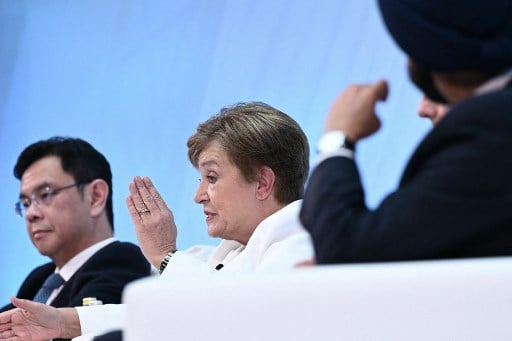Kristalina Georgieva, managing director of the International Monetary Fund (IMF), says the world economy has proved resilient but the outlook is underwhelming with “weak” medium-term growth prospects.
Speaking during the annual meetings of IMF/World Bank Meetings in Washington, Georgieva reminded her audience of projections made six months earlier during the Spring Meetings when the IMF predicted “a considerable slowdown in growth, but no recession. Six months on, where do we stand? In a nutshell, better than feared but worse than needed. And uncertainty has continued to go up, up, up. Gold values, too.”
“As you saw in our latest World Economic Outlook, global growth has held fairly steady, and it is projected to slow from 3.3% last year to 3.2% this year and 3.1% in 2026. That is better than we feared, better than what we projected six months ago.
“The question is why has the global economy shown such resilience in the face of uncertainty and profound transformations in geopolitics, in technology, in trade relations, in demography?”
Georgiva posited two reasons: improved policy fundamentals within many countries which have “pursued sound policies, strengthened their institutions and their frameworks,” and an agile private sector.
“The adaptability of the private sector, which has shown agility in import front-loading, in supply chain strengthening, in just navigating uncertainty is quite remarkable. But even so, the outlook we have is underwhelming. Medium-term growth prospects remain weak. Public debt is near record highs and continues to climb, and the global economy is excessively imbalanced.”
She said countries need to “unlock the private sector for economies to grow and deliver more jobs and better livelihoods.”
Priorities for growth
To do this she outlined three overarching priorities needed to ensure that the private sector thrives. Georgieva said the fund is “encouraging our members to embrace a regulatory house-cleaning to help foster innovation and entrepreneurship and I urged them to keep trade as an engine of growth.”
To achieve this the countries must put in place basic building blocks of private enterprise: “build strong institutions, free and fair markets and stable macroeconomic environments.”
The second priority she said is for countries to secure strong macroeconomic fundamentals for navigating a more turbulent world. To do this she said they “must rebuild their fiscal spaces and reduce debt and rely on domestic sources of revenue, and make smart budget choices.”
On the monetary front, Georgiva said countries must guard against financial instability. Georgieva identified the third priority as a push to “reduce global imbalances.” Singling out countries with excessive surpluses like China, she advised that they boost demand and spend more on social safety nets. She also advised that those with excessive deficits like the US, for instance, need to reduce fiscal deficits and incentivise private savings.
Georgiva said the IMF will continue to “review debt sustainability framework for low-income countries” while improving “coordination between creditors and debtors.”
Addressing the fears expressed earlier in the year when the US rolled out a raft of tariffs, she noted that it was heartening that out of 191 members of the IMF, only three have “moved forcefully on tariffs” with the remaining 188 members saying “no thank you.” She expressed the hope that the situation will remain the same.
Want to continue reading? Subscribe today.
You've read all your free articles for this month! Subscribe now to enjoy full access to our content.
Digital Monthly
£8.00 / month
Receive full unlimited access to our articles, opinions, podcasts and more.
Digital Yearly
£70.00 / year
Our best value offer - save £26 and gain access to all of our digital content for an entire year!

 Sign in with Google
Sign in with Google 



